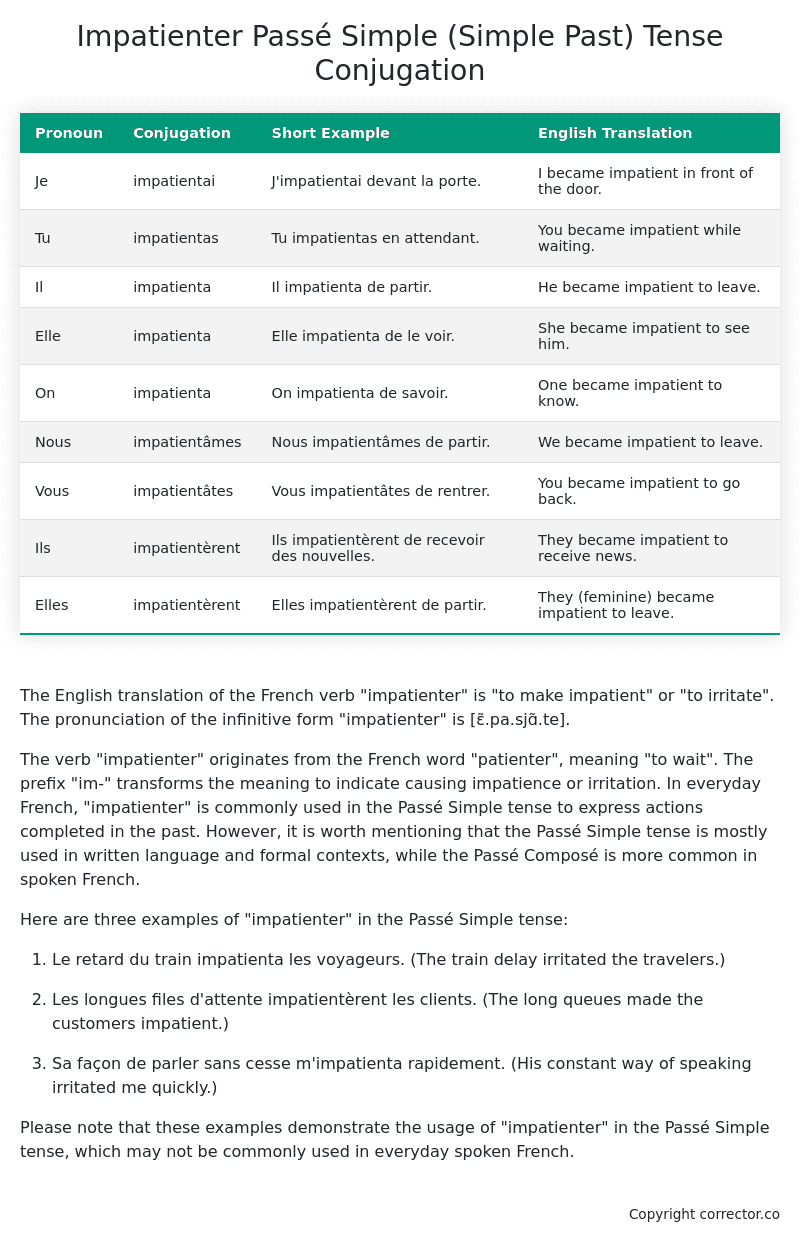Passé Simple (Simple Past) Tense Conjugation of the French Verb impatienter
Introduction to the verb impatienter
The English translation of the French verb “impatienter” is “to make impatient” or “to irritate”. The pronunciation of the infinitive form “impatienter” is [ɛ̃.pa.sjɑ̃.te].
The verb “impatienter” originates from the French word “patienter”, meaning “to wait”. The prefix “im-” transforms the meaning to indicate causing impatience or irritation. In everyday French, “impatienter” is commonly used in the Passé Simple tense to express actions completed in the past. However, it is worth mentioning that the Passé Simple tense is mostly used in written language and formal contexts, while the Passé Composé is more common in spoken French.
Here are three examples of “impatienter” in the Passé Simple tense:
-
Le retard du train impatienta les voyageurs.
(The train delay irritated the travelers.) -
Les longues files d’attente impatientèrent les clients.
(The long queues made the customers impatient.) -
Sa façon de parler sans cesse m’impatienta rapidement.
(His constant way of speaking irritated me quickly.)
Please note that these examples demonstrate the usage of “impatienter” in the Passé Simple tense, which may not be commonly used in everyday spoken French.
Table of the Passé Simple (Simple Past) Tense Conjugation of impatienter
| Pronoun | Conjugation | Short Example | English Translation |
|---|---|---|---|
| Je | impatientai | J’impatientai devant la porte. | I became impatient in front of the door. |
| Tu | impatientas | Tu impatientas en attendant. | You became impatient while waiting. |
| Il | impatienta | Il impatienta de partir. | He became impatient to leave. |
| Elle | impatienta | Elle impatienta de le voir. | She became impatient to see him. |
| On | impatienta | On impatienta de savoir. | One became impatient to know. |
| Nous | impatientâmes | Nous impatientâmes de partir. | We became impatient to leave. |
| Vous | impatientâtes | Vous impatientâtes de rentrer. | You became impatient to go back. |
| Ils | impatientèrent | Ils impatientèrent de recevoir des nouvelles. | They became impatient to receive news. |
| Elles | impatientèrent | Elles impatientèrent de partir. | They (feminine) became impatient to leave. |
Other Conjugations for Impatienter.
Le Present (Present Tense) Conjugation of the French Verb impatienter
Imparfait (Imperfect) Tense Conjugation of the French Verb impatienter
Passé Simple (Simple Past) Tense Conjugation of the French Verb impatienter (You’re reading it right now!)
Passé Composé (Present Perfect) Tense Conjugation of the French Verb impatienter
Futur Simple (Simple Future) Tense Conjugation of the French Verb impatienter
Futur Proche (Near Future) Tense Conjugation of the French Verb impatienter
Plus-que-parfait (Pluperfect) Tense Conjugation of the French Verb impatienter
Passé Antérieur (Past Anterior) Tense Conjugation of the French Verb impatienter
Futur Antérieur (Future Anterior) Tense Conjugation of the French Verb impatienter
Subjonctif Présent (Subjunctive Present) Tense Conjugation of the French Verb impatienter
Subjonctif Passé (Subjunctive Past) Tense Conjugation of the French Verb impatienter
Subjonctif Imparfait (Subjunctive Imperfect) Tense Conjugation of the French Verb impatienter
Conditionnel Présent (Conditional Present) Tense Conjugation of the French Verb impatienter
Conditionnel Passé (Conditional Past) Tense Conjugation of the French Verb impatienter
Conditionnel Passé II (Conditional Past II) Tense Conjugation of the French Verb impatienter
L’impératif Présent (Imperative Present) Tense Conjugation of the French Verb impatienter
L’impératif Passé (Imperative Past) Tense Conjugation of the French Verb impatienter
L’infinitif Présent (Infinitive Present) Tense Conjugation of the French Verb impatienter
L’infinitif Passé (Infinitive Past) Tense Conjugation of the French Verb impatienter
Le Participe Présent (Present Participle) Tense Conjugation of the French Verb impatienter
Le Participe Passé (Past Participle) Tense Conjugation of the French Verb impatienter
Struggling with French verbs or the language in general? Why not use our free French Grammar Checker – no registration required!
Get a FREE Download Study Sheet of this Conjugation 🔥
Simply right click the image below, click “save image” and get your free reference for the impatienter Passé Simple tense conjugation!

Impatienter – About the French Passé Simple (Simple Past) Tense
Formation
Usage
Narration
Historical Context
Interactions with other tenses
Passé Composé
Imparfait
Conditional and Subjunctive
Summary
I hope you enjoyed this article on the verb impatienter. Still in a learning mood? Check out another TOTALLY random French verb conjugation!


